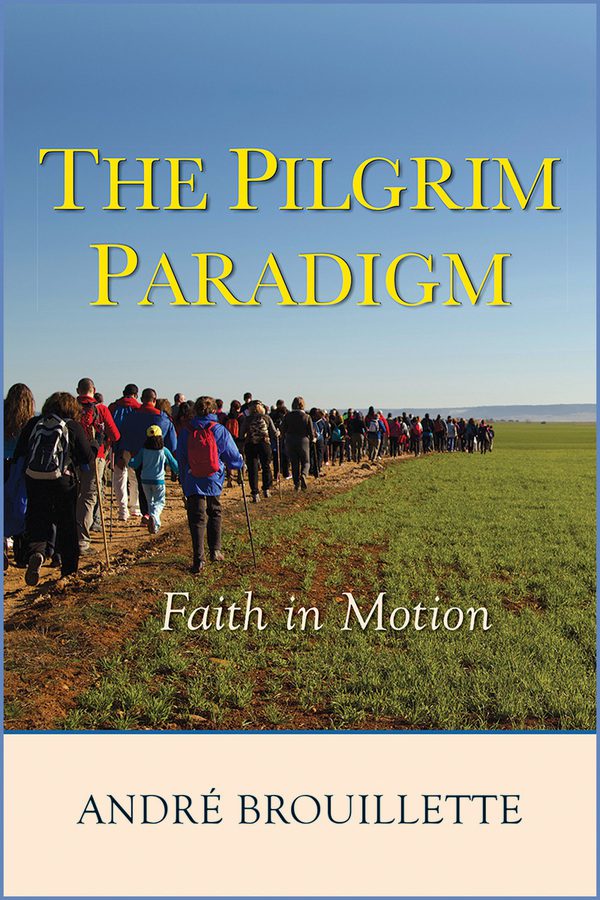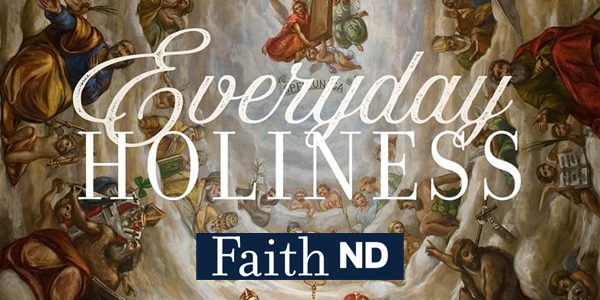The second virtual event in the Medieval Institute’s Pilgrimage for Healing and Liberation series explored the theology of pilgrimage and the image of the Pilgrim Church. This event was moderated by Rev. Daniel Horan, OFM, Director of the Center for Spirituality at Saint Mary’s College. Horan spoke with two theological experts on pilgrimage: Rev. André Brouillette, SJ, Associate Professor of Systematic and Spiritual Theology at Boston College School of Theology and Ministry, and Layla Karst, Assistant Professor of Theological Studies, Loyola Marymount University. To begin, the panelists presented on the key elements of pilgrimage and its connection to racial justice work. Their talks were followed by an opportunity for questions and answers from viewers.
Brouillette spoke first about pilgrimage as it connects to racial justice and healing of memory. He began with the biblical foundation for pilgrimage in the call of Abraham and the Exodus. These stories feature movement toward a destination, which leads to freedom and establishes a covenantal relationship with God. In the Christian tradition, pilgrimage involves the memory of a person or event and a place that is given special meaning through human narrative. Embodiment helps us to be present, movement symbolizes that we are on the way, and encounters can reconfigure the group of pilgrims in egalitarian ways. Brouillette highlighted two recent pilgrimage experiences related to racial justice. Professor Mary Jo Kietzman’s urban pilgrimage in Flint, MI winds through the city’s post-industrial neighborhoods to a church housing an icon of Our Lady of Flint. In 2017, Canadian Jesuits and First Nations people organized a canoe pilgrimage following the release of Canada’s Truth and Reconciliation Commission report on Indigenous residential schools. These examples, Brouillette said, “were opportunities for encounters, to share in that challenging journey of dealing… with the past, and building bridges and a future together” (21:40).
Karst started thinking about pilgrimage after traveling to the Holy Land as a masters student at Notre Dame. She realized that theologians since the Second Vatican Council have written copiously on the image of the Pilgrim Church, but few have studied the actual practice of pilgrimage. Christian pilgrimage is “an inherently plural phenomenon” that includes journeys to a destination (a sacred place or holy person), travel within a sacred space, or even a time of journeying, in which the act of journeying is the point, and the destination is less important. Karst observed that the categories often overlap, and each pilgrimage develops its own rituals and ways of ordering the community. Trying to normalize the practice is like “trying to tame the Spirit.” Pilgrimage is a way of doing theology and should, therefore, be seen as part of the church’s liturgical life.
Pilgrimages made for the sake of healing and reconciliation seem to Karst to be a faith response to the signs of the times. Creativity is required if the pilgrim community is to instantiate the inclusive church that we want to be. Karst observed that, in the Middle Ages, the church was imagined as the pilgrim host, the party that extended hospitality and provided for travelers in need. By contrast, the Vatican II image of the Pilgrim Church identifies the church with the pilgrim, the stranger who is wayfaring as a guest in the world. Karst challenged us to imagine which Church is most needed in our time and place today.
During the Q&A, the panelists discussed the difference between a pilgrim and a tourist. Brouillette argued that the difference lies in intentionality; a person must make a decision to be on a pilgrimage and be open to an interior journey. Karst noted that, historically, pilgrimage has always been caught up in the economics of tourism and commodification, but the difference may lie in the person’s identification with a larger Christian community. A second question picked up on the notion that reaching one’s destination is not the end of the journey and asked the panelists to connect this idea to racial justice. The panelists responded by pointing to the eschatological dimension of pilgrimage. It is necessary for us to work toward racial justice here and now while knowing that the work will not be completed without the intervention of God. We need eschatological patience and hope. Finally, the panelists talked about a theology of embodiment in relation to pilgrimage. Even virtual pilgrimages are embodied, and tactile, sensory rituals are an important component.
Visit the event page for more.



